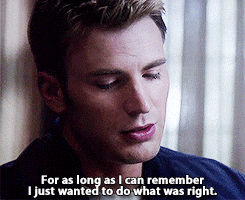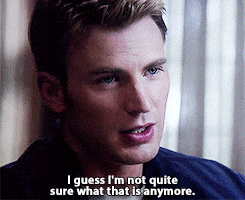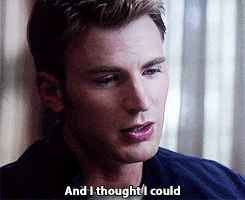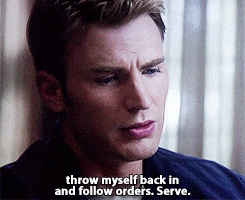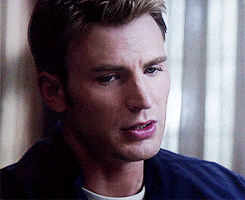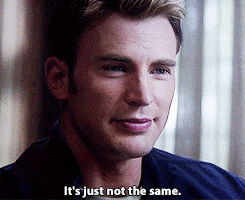laylainalaska:shinelikethunder:dendritic-trees:derevko:last-snowfall:Steve name me one time between
laylainalaska:shinelikethunder:dendritic-trees:derevko:last-snowfall:Steve name me one time between Basic and going into the ice that you actually followed orders. ONE. TIME.I have feelings about this. I’m supposed to be doing work, but its hard, so I’m gonna explain them instead. Right from the start of CA:TFA we see that Steve really specifically wants to be a soldier. He knows there’s all sorts of various ways to support the war effort, but not, specifically he wants to fight on the front lines. But Steve is never a particularly good soldier, in fact, he very specifically isn’t a good soldier. Steve is a good man not a perfect soldier. Steve NEVER has any success when he tries his hand at being a regular soldier, or even a supersoldier. In CA:TFA he ends up working with the Howling Commandos, almost entirely outside of the regular military structure and that’s when he manages all the serious heroics and really lives up to his potential. In Avengers at the beginning he tries to be a good soldier for a while and tries to follow Fury’s orders, but for the first half of the movie Steve is lost and miserable and visibly hiding behind his USO Tour “Captain America” persona. But its only when he goes off on his own, breaks into store rooms and steals Fury’s proto-type tesseract weapons, that he really gets anything done (before that he gets batted about by Loki and sort of wanders about at loose ends), and he doesn’t really get back into a leadership role and really become actual Captain America again, until he steals a quinn jet with Natasha and Clint.And despite that, in CA:WS he’s back at Shield, trying to be ‘the greatest soldier in history’ and ‘follow orders’, and… not doing that at all…So where does Steve’s abortive fascination with being a good soldier come from?Partly I think its an expression of his very obvious depression. I’ve seen about umpteen criticisms of Steve’s ‘we have our orders’ line to Tony in Avengers but I think that the fact its out of character is the point. Steve is miserable, and lost, he doesn’t know what makes him happy, he doesn’t know what he wants to do with himself so he follows Nick Fury’s orders, because he has given up. But also I think that even though Steve doesn’t really want to be the sort of person who follows orders, he to a certain extent wants to want it, sort of as the equivalent of a very bright girl who plays dumb in class because she’s been told no one likes smart girls. The good soldier is very much the model of ideal masculine success that Steve would have grown up with but wouldn’t have ever been able to achieve Which is ironic given that the ideal male icon most of the cast of the Avengers probably grew up with… is Captain America.I think it’s more that for all Steve is willing to be a disobedient shit when his orders conflict with his conscience, he does best when he’s got structure. What he really, deeply needs, his basic prerequisite for not feeling like he’s at a loose end, is to serve as part of something that’s bigger than himself. Something with a purpose. He’s acutely aware that large institutions are fallible and he’s first in line to challenge their flaws when need be, but he’s still first and foremost a team player.The way I read him in Avengers is—okay, he’s isolated, disoriented, alone and adrift in the modern world and not sure he has anything to contribute to it, and he’s handed A Chance. He’s skeptical of it and whether he can be relevant to it at all, but still. A task, a team, a meaningful purpose—saving the world, even! Except the team is a motley assemblage (heh) of disorganized assholes who don’t want to play ball. All his lines about “we have orders” come off as increasingly desperate pleas of “GUYS, CAN WE PLEASE STAY ON TOPIC” ”COME ON, GUYS, WE’VE GOT SHIT TO DO” “TONY, ARE YOU ACTIVELY TRYING TO TANK OUR CHANCES OF EVER WORKING AS A TEAM OR WHAT.” And he is so zeroed in on the task at hand that he doesn’t stop to think critically about the big picture or the agenda of the people who’ve assigned the task until Bruce and Tony have pointed out that something smells funny. Which I don’t think is general blind trust in authority, more like a combination of lack of frame of reference (which crops up again in the form of his doubts in CA:TWS—is it SHIELD, or is it his difficulty adjusting to the modern world? SPOILERS: IT’S SHIELD) and a priority list where questioning authority has taken the backseat to “a task! a team! a chance to do something useful and beat the crap out of tyrannical assholes!” Steve is most likely to defy authority when authority is pointlessly preventing him from making himself useful.Basically, yes, Whedon’s characterization work in Avengers is wobbly and he’s way too eager to pass off “principled, self-sacrificing team player (military flavor)” as “good obedient soldier” because it’s a convenient character shorthand and source of friction in an ensemble piece with lots of balls in the air. But it’s mostly a problem of emphasis, not wildly OOC behavior, and by and large I think his characterization in Avengers is internally consistent with both TFA and TWS. (Leaving aside the separate problem of Whedon sacrificing characterization for snappy one-liners, because… well, it’s a problem.)I agree with the latter commentary, and I also kind of feel like fandom takes the “Steve breaks all the rules!” idea and runs with it to a point where it’s way beyond his actual, canonical characterization (more so in meta than in fic, usually). I get why, because it’s a reaction against the “Steve is a joyless rule follower” characterization, which is even more OOC. And obviously there are a bunch of different takes on Steve out there, and they’re all just as valid as my take on him.But I really don’t think Steve wants to disobey orders or likes it when he has to. I’m pretty sure that Steve’s ideal for himself is someone who is polite and good, who is nice to the neighbors, who pays his taxes on time and serves his country well and capably when he has to, who basically does all the right and proper things, and is a fine upstanding example of manhood according to the society in which he grew up. The problem is that he’s too damn good to actually BE good, is the best way I can put it — because the world is broken, and he keeps running into situations where the law is wrong, or the orders are wrong, and so he does the right thing, the moral thing. But on some level I don’t really think Steve grasps that this is (mostly) a virtue rather than a character flaw — he still thinks of himself as someone who COULD be, who SHOULD be a good, well-behaved citizen and a fine soldier, if he could just stop running into all these damn EXCEPTIONS. Basically I don’t think Steve is willing to accept that the two things (good soldier vs. good man) have to be in conflict; he wants to live in a world where he can be both, except because he’s in a terribly flawed and broken world, he keeps having to choose one over the other.And this:Steve is most likely to defy authority when authority is pointlessly preventing him from making himself useful.EXACTLY. It’s not that Steve runs around just looking for orders to break. It’s that he breaks the orders which needlessly prevent him from following his conscience. Bear in mind that in CA:TFA, after he ran off to rescue Bucky et al, he didn’t just, say, keep going and form his own rogue squad of mercenaries. He brought them back and then turned himself in for punishment. Steve isn’t an anarchist and he isn’t (much of) a revolutionary, except under very specific, very personal circumstances (destroying the Hydra-infested SHIELD in CA:TWS). Steve is Lawful Good; it’s just that when the two come into conflict, the “good” part trumps the “lawful” part (as it does in all properly done Lawful Good characters). -- source link
Tumblr Blog : forassgard.tumblr.com
